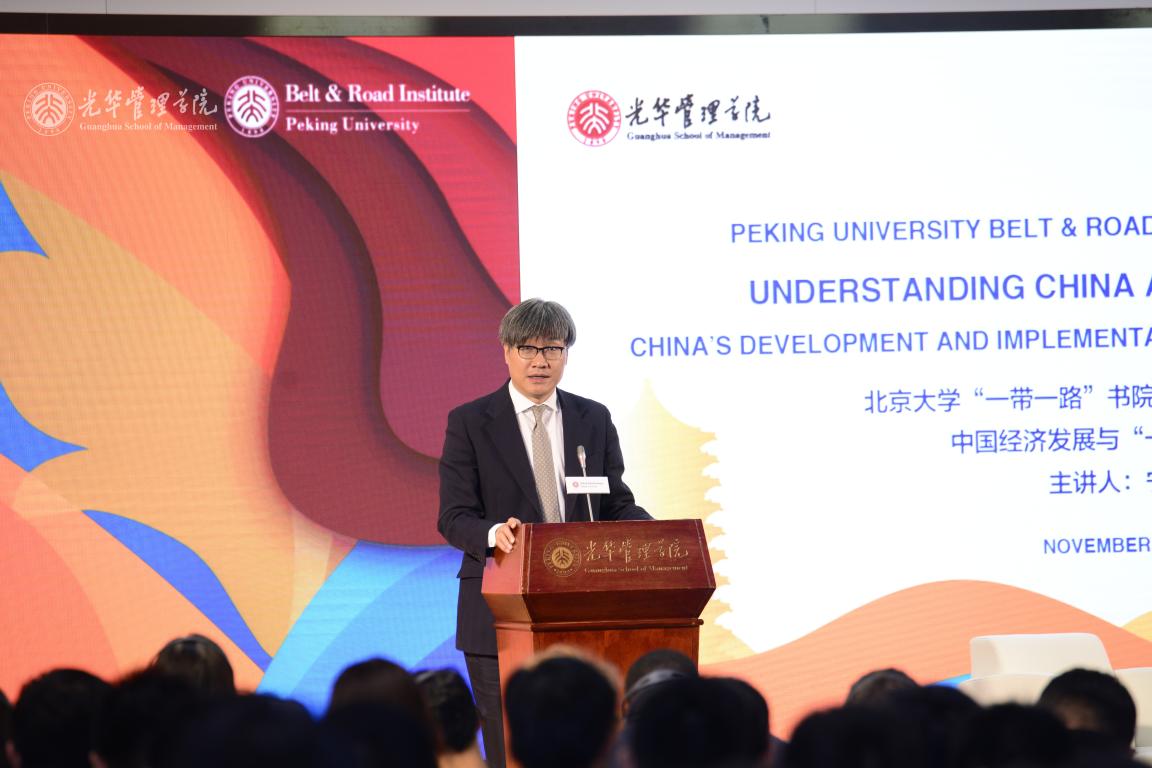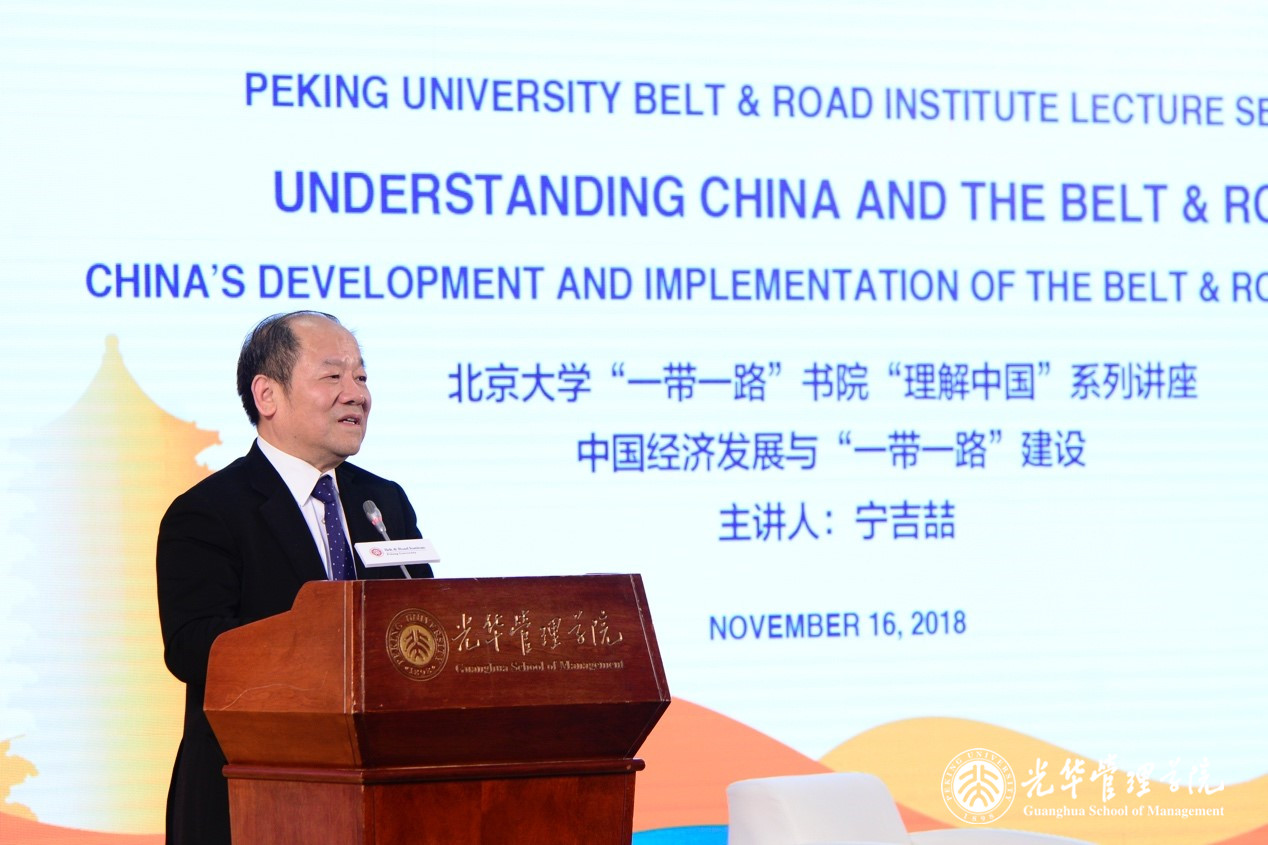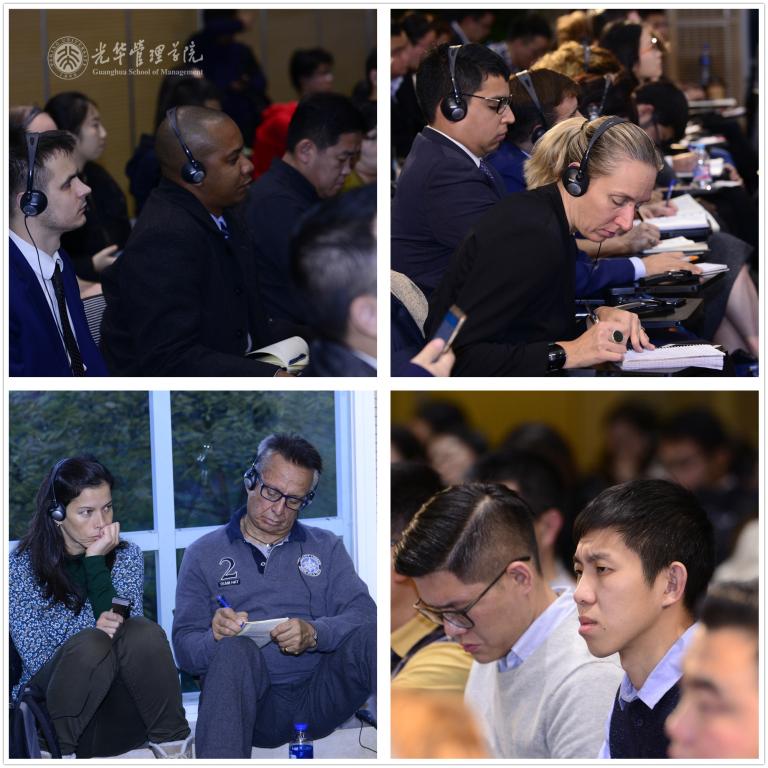On November 16, 2018, Mr. NING Jizhe, Vice Chairman of the National Development and Reform Commission (NDRC) and Commissioner of the National Bureau of Statistics, visited Peking University’s Guanghua School of Management to give a lecture entitled “China’s Economic Development and Implementation of the Belt & Road Initiative”. This lecture was delivered as part of the PKU Belt & Road Institute’s “Understanding China and the Belt & Road” Lecture Series and aimed to share theoretical and practical perspectives on the implementation of the Belt & Road Initiative with students. Professor WANG Bo, Vice President of Peking University, also listened to the lecture on-site with students. After the lecture concluded, Professor LIU Qiao, Dean of the Guanghua School of Management held a dialogue with Vice Chairman NING, raising questions submitted by audience members that covered topics from overseas investment by private companies to China’s macro-economic landscape.

Vice President WANG Bo extended thanks to Vice Chairman NING for bringing PKU students an authoritative representation of the Belt & Road Initiative and for sharing his insights and opinions as a key government leader tasked with the BRI’s implementation. Vice President WANG indicated that Peking University would continue to support the development of PKU Belt & Road Institute, fully combining education and research with practice. Through the Belt & Road Institute, PKU will try to build an open international education exchange platform committed to finding solutions to the critical issues confronting humanity as a result of new trends of globalization.

Throughout his lecture, Vice Chairman NING used many cases, anecdotes, and data to articulate the main tenets of the BRI, describe the results the Initiative has already generated, and outline future plans for the Initiative, bringing the audience a nuanced perspective of the BRI’s progress. The event was sold out with 300 people in attendance from 34 countries and regions, including more than 10 officials from the embassies of Australia, Canada, Singapore, Spain, and Sweden, among others.
Vice Chairman NING pointed out that the BRI represents China’s major effort to open wider to the world, is part of China’s top-level economic diplomacy, and will serve as the overall vision for China’s opening-up and external economic cooperation for the foreseeable future. This initiative has been guided by the principle of “extensive consultation, joint contribution and shared benefits” and has aimed to improve policy, infrastructure, trade, financial, and people-to-people connectivity. Over the past five years, it has moved from an envisioned concept into real action, making significant progress exceeding initial expectations.
First, the core philosophy of “extensive consultation, joint contribution and shared benefits” advocated by the Belt & Road Initiative has become an international consensus written into documents of key international institutions such as the UN, APEC, G20 and SCO, among others. The Initiative has been regarded as a global public good of significant influence.
Secondly, positive international partnerships are being developed, and policy coordination has reached new heights. China has signed over 160 cooperation documents with over 140 countries and international organizations, signed MOUs or exchanged diplomatic letters on bilateral financial regulatory cooperation with over 30 countries, signed bilateral air service agreements with over 60 countries, and facilitated direct flights with over 40 countries along the Belt and Road.
Thirdly, infrastructure construction has accelerated, and interconnectivity between regions continues to improve. Several projects focusing on the “six economic corridors” and “six roads” involving multiple countries and harbors have made substantial progress. A total of 11,500 trains made the trans-continental voyage between China and Europe with over 85% load rates.
Fourth, the BRI has helped promote liberalization of trade and investment resulting in freer trade flows. The value of cargo trade with countries along the Belt & Road has cumulatively exceeded USD $6 trillion, and FDI has exceeded USD $70 billion. Total investment flowing to overseas economic and trade cooperation zones in countries along the Belt & Road amounted to over USD $20 billion, contributing billions of dollars in tax revenues for local countries.
Fifth, diversified investment and financing guarantee mechanisms have been created to make new headway in financial integration. Chinese banks have set up over 70 first-tier institutions in countries along the Belt & Road. Meanwhile, more than 50 banks from over 20 countries and regions along the Belt & Road have set up branches in China. The Cross-border Interbank Payment System covers 41 countries and regions along the Belt & Road.
Sixth, extensive opportunities have been created to promote communication across industries, heralding in a new chapter for people-to-people exchange. Talent with technical expertise is being trained for countries along the Belt & Road through “Silk Road” scholarships and by establishing educational institutions abroad.

In the dialogue session, Mr. LIU Qiao and Mr. NING discussed on hot topics centering on the building of the Belt and Road including investment and financing mechanism, overseas investment by private companies, and green development etc. On the topic of investment and financing mechanism, Mr. NING highlighted that all outbound investments and project construction adhere to market-oriented operation and consistent with the principles of global business standards. Besides, increasing number of privately owned enterprises as well as small and medium-sized businesses have positioned themselves to seize the ever-widening range of BRI opportunities. Regarding green development, Mr. NING indicated that the Chinese government has taken initial steps to incorporate environmentally sustainable, or green, strategies and objectives into the BRI. To build a Silk Road to green development, practical efforts have been made to promote green and low-carbon infrastructure construction and operation management, taking into full account the impact of climate change on the construction. Ecological protection, prevention and control of desertification, and clean energy, among others, already feature prominently in strategic planning exercises for implementing the Belt and Road Initiative.
Mr. NING concluded that the construction of the Belt & Road seeks to promote China’s high-quality development and maintain a high-standard of opening-up. The BRI is also of great significance to the peaceful development of countries around the world, generating mutual benefit for countries involved, and building a shared future for humanity etc. Turning this “framework sketch” into a more detailed and refined “elaborate painting” is the next goal. The next stage will focus on collective efforts to ensure the Belt and Road creates high-quality development.
Vice Chairman NING’s lecture provided students with a government perspective on the BRI to complement the academic perspective offered by Guanghua Dean LIU Qiao during the first lecture of the “Understanding China and the Belt & Road” Lecture Series. Future lectures will bring additional perspective, including those of business involved in BRI projects overseas.
Peking University Belt & Road Institute Lecture Series: Understanding China and the Belt & Road
Peking University announced its new Belt and Road Institute on April 20, 2018. The Institute, rooted in Guanghua School of Management, will provide educational opportunities to future leaders for the new type of globalization, conduct research relevant to BRI projects, and serve as a platform for people-to-people exchange. Over the 2018-19 academic year, the Belt & Road Institute will be organizing a series of lectures entitled “Understanding China and the Belt & Road” for local and international scholars alike. The lectures will serve as a platform for high-level analysis and critique from leading Chinese academics, industry professionals and commentators on what lies ahead for businesses as the global environment changes and boundaries shift.
 Programs
Programs